Boating and Water Sports Accidents: Personal Injury Liability on the Water
During the summer, there’s nothing quite like spending a day on the water, enjoying boating and water sports. Whether it’s a peaceful lake, a winding river, or the vast ocean, these activities offer relaxation and adventure. However, as with any recreational activity, accidents can happen, and understanding personal injury liability on the water is crucial.
Here are some important factors to consider when accidents occur during boating and water sports.
Basics of Boating and Water Sports Accidents
Before we dive into personal injury liability, let’s briefly cover the common types of accidents that can take place on the water:
Collisions
Watercraft like boats and jet skis can collide with each other, resulting in injuries to those on board.
Drowning
Insufficient safety measures or lack of experience can lead to accidents where people end up in the water without proper protection.
Water Sports Incidents
Activities such as water skiing, wakeboarding, and tubing carry inherent risks of falls and collisions.
Capsizing and Sinking
Boats may capsize or sink, potentially trapping passengers and causing injuries.
Negligent Behaviour
One of the key factors in determining liability on the water is negligence. If an accident occurs because a boat operator was negligent, the injured party may have grounds for a personal injury claim.
Negligent actions may include operating a boat while under the influence, disregarding safety rules, or failing to yield the right of way.
Seek Legal Counsel
Navigating personal injury liability on the water can be complex. If you’ve been injured in a boating or water sports accident and believe that someone else’s negligence played a role, it’s advisable to consult with a personal injury attorney. They can assess the specifics of your case and guide you through the legal process.
Boat Operator Responsibility
In many cases, the person operating the watercraft bears primary responsibility for the safety of passengers and others on the water. This responsibility includes following speed limits, maintaining a safe distance from other boats, and ensuring that all safety equipment is on board and in good working condition.
If the operator does not follow the regulation, and it leads to an accident then you can file a lawsuit for damages.
Rental Companies
When you rent a boat or watercraft, the rental company may also share liability in specific situations. Rental companies are generally responsible for providing well-maintained and safe equipment.
If an accident occurs due to equipment failure or a known issue that the company failed to address, they could be held liable.
Insurance and Compensation
In many boating and water sports accidents, insurance coverage plays a significant role in providing compensation for injuries.
Boat owners and rental companies typically carry liability insurance, which can help cover medical expenses and damages in the event of an accident.
Reporting and Documentation
If you’re involved in a boating or water sports accident, it’s essential to report the incident to the relevant authorities and seek medical attention.
Additionally, documenting the scene with photographs and collecting witness statements can be valuable when pursuing a personal injury claim.



